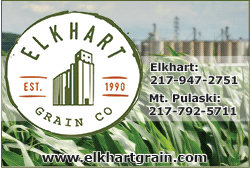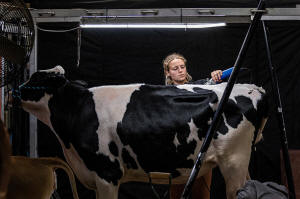Fake cows ready for milking at US state fairs as bird flu threat looms
 Send a link to a friend
Send a link to a friend
 [August 31, 2024]
By Tom Polansek and P.J. Huffstutter [August 31, 2024]
By Tom Polansek and P.J. Huffstutter
WEST ALLIS, Wisconsin (Reuters) - In Michigan this year, where dairy
workers and herds have fallen ill from bird flu, a pair of unlikely
prized cows are being prepped to take the state fair stage.
State fair organizers are this year featuring Milkshake and Buttercup,
two life-sized fiberglass cows complete with rubber teats and
water-filled udders, for a popular milking demo.
The head of the Minnesota State Fair's Moo Booth came up with a similar
work around for its hands-on milking event: a fake dairy cow named
Olympia.
"Normally, we'd have a real cow out there," said Jill Nathe, the fair's
deputy general manager of agriculture and competition. "We just can't do
that right now."
As avian influenza continues to spread, infecting cattle herds for the
first time this year as well as four dairy workers, U.S. state and
county fair organizers have been forced to reimagine nostalgic summer
traditions long celebrated by city and rural folk alike.
For farmers and students eager for blue ribbons and bragging rights, the
outbreak has forced them to navigate new testing rules and manage
logistical headaches in order to obtain a clean bill of health for
animals before entering the show ring.

State and local officials say they are trying to protect people and
animals from the H5N1 virus as some dairy farmers have declined to test
their herds. Experts worry that further transmission of the virus could
help it adapt to spread between humans.
The risk of viral spread among herds prompted some county fairs in
Michigan to cancel dairy shows, while the Iowa State Fair shuttered its
milking barn.
In Minnesota, state fair staff procured extra gloves and face shields
from COVID-era stockpiles for the livestock crew, and kept pregnant
dairy cows out of the fair's birthing center.
Several farm states, including Wisconsin, required lactating cattle to
test negative within seven days of arriving at the fairgrounds.
Wisconsin dairy farmer Rick "RT" Thompson said he had to carefully time
visits from his veterinarian, so the milk test results for H5N1 would
fall within the required window for different fairs. His vet's wife
personally drove samples to a state lab in Madison to ensure they
arrived on time for testing.
"It's not a convenient thing," said Thompson, 57, who has attended
Wisconsin's state fair for 46 years.
Michigan banned lactating cows from all public exhibitions until the
state goes two months without finding an infected herd. With only one
state fair per year, the chance has passed for 2024. Michigan last
reported a case on Monday.
[to top of second column]
|

State fair, West Allis, Wisconsin, U.S., August 9, 2024. REUTERS/Jim
Vondruska

"We were all waiting for that 60-day
window," Michigan State Fair livestock director LC Scramlin said.
"But we kept having another case and another one happen."
COWS STAY HOME
At the Wisconsin State Fair, where visitors can buy everything from
cream puffs to hot tubs, veterinarians inspected cattle before they
stepped off their trailers to make sure the animals were healthy
upon arrival - a departure from previous years, exhibitors said.
The risk of bird flu was enough to convince Jennifer and Bethany
Droessler to keep a lactating cow at home. The sisters from Cuba
City, Wisconsin, instead hauled other cattle to show at the event's
Dairy Lane, where fairgoers petted and took selfies with animals
topping the scales at more than 1,000 pounds (454 kg).
"We'll aim for next year and hopefully it won't be an issue," said
Jennifer Droessler, 30.
More than 190 dairy herds nationwide have been infected since March,
and 13 farm workers tested positive following exposure to cows and
poultry.
The workers all recovered, and the U.S. Centers for Disease Control
and Prevention says H5N1 remains a low risk for the general public.
Still, CDC is advising people not to eat, drink or touch anything in
animal areas at fairs.
Several fairgoers in Wisconsin, the No. 2 milk-producer and top
cheese-making state, said they were not aware of, or concerned
about, the guidelines. Visitors chomped on treats including taffy
apples and cheese curds as they strolled between cows chewing their
cud.
"I don't think it's a big risk," said O.E. Glieber of Delafield,
Wisconsin, 88, who came to the fair with grandchildren. "The CDC
overreacts with a lot of stuff."
(Reporting by Tom Polansek in West Allis, Wisconsin, and PJ
Huffstutter in Chicago; Editing by Caroline Stauffer and Bill
Berkrot)
[© 2024 Thomson Reuters. All rights reserved.]This material may not be published,
broadcast, rewritten or redistributed.
Thompson Reuters is solely responsible for this content.
 |